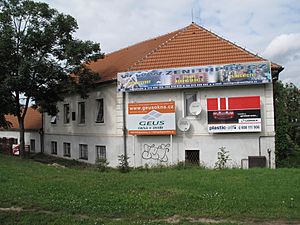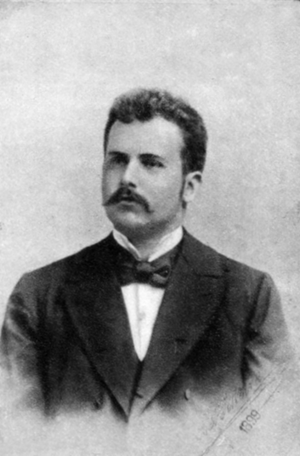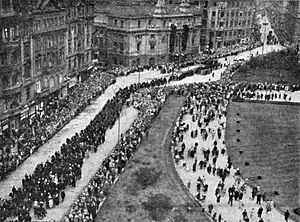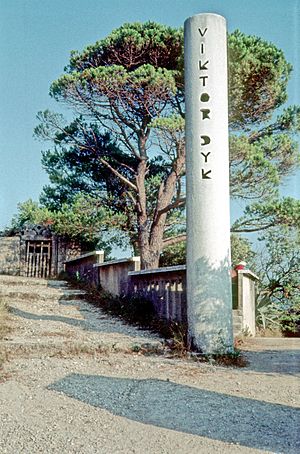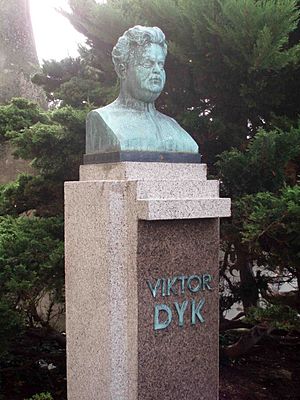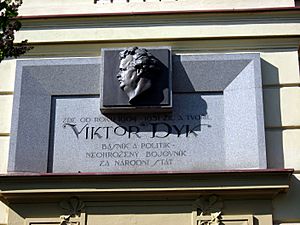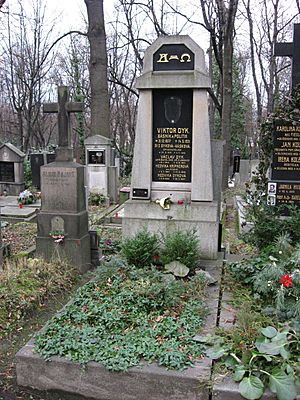Viktor Dyk facts for kids
Quick facts for kids
Viktor Dyk
|
|
|---|---|
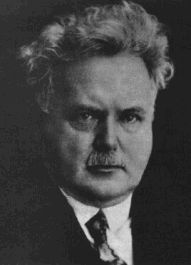
Photograph of Dyk, circa 1917
|
|
| Born | 31 December 1877 Pšovka u Mělníka, Kingdom of Bohemia, Austria-Hungary |
| Died | 14 May 1931 (aged 53) Lopud, Yugoslavia |
| Occupation | Poet, politician, playwright, prose writer, journalist |
| Literary movement | Czech nationalist |
Viktor Dyk (born December 31, 1877 – died May 14, 1931) was a famous Czech writer and politician. He wrote poems, stories, and plays. He was also a strong supporter of Czech independence. During World War I, he was put in jail for speaking out against the Austro-Hungarian empire. Viktor Dyk helped start a political party and became an important figure in Czech politics. He passed away at 53, leaving behind many important works.
Contents
Life of Viktor Dyk
Viktor Dyk was born in a place called Pšovka u Mělníka in the Kingdom of Bohemia in 1877. When he was 11, his family moved to Prague. This is where he started to write. In 1904, his family settled in the Prague area of Vinohrady. That same year, he published a novel called The End of Hackenschmid. This book showed his feelings against the Austrian rule.
Viktor Dyk went to a gymnasium (a type of high school) in Prague. One of his teachers was the famous writer Alois Jirásek. Later, Dyk studied law at Charles University. Even though he studied law, he spent most of his life focused on writing and politics.
Early Political Steps
In 1911, Viktor Dyk became more involved in politics. He joined a political party called Státoprávně pokroková strana. He tried to get elected in 1911 but did not win.
Dyk believed that Czech culture should be separate from German culture. He wrote in a magazine called Lumír. He often said that Bohemia had to become truly Czech. He warned against Czech people becoming "Czech speaking Germans."
World War I and Czech Independence
During World War I, Viktor Dyk kept writing. He even helped write a part of an opera for the famous composer Leoš Janáček. The opera was called The Excursions of Mr. Brouček to the Moon and to the 15th Century.
Later, Dyk was put in prison in Vienna. This was because he resisted the Austro-Hungarian Empire. He was in jail in 1916 and 1917. He had suggested that parts of the empire, like Moravia and Bohemia, should become independent.
In May 1917, Dyk was one of the writers who signed the Manifesto of Czech writers. This was a very important document. It was created by Jaroslav Kvapil, who was the director of the Czech National Theatre. Kvapil got 200 writers to sign it. The manifesto asked Czech leaders to support the idea of Czech self-rule. In 1918, Dyk helped create the Czechoslovak National Democratic Party.
Writing and Political Influence
Viktor Dyk's writings aimed to inspire Czech people to fight for their own country. In 1907, he became the editor of the magazine Lumír. He led this magazine for the rest of his life. The writers and artists involved with Lumír helped create a new direction for Czech culture. Before this, Czech culture was often seen as coming from German ideas. But the Lumír group, including Dyk, helped Czech culture become more unique and focused on its own heritage.
Dyk's political ideas were conservative and nationalist. In 1920, he was elected to the Czech parliament. During the time of the First Republic of Czechoslovakia, Viktor Dyk was a well-known opponent of President Tomáš Garrigue Masaryk. In 1928, he married the writer Zdenka Hásková. In 1929, Dyk became a senator for Czechoslovakia.
Death and Burial
Viktor Dyk died on May 14, 1931. He had a heart failure while swimming in the sea. This happened near the island of Lopud, which is close to Dubrovnik in Croatia. Many people attended Dyk's funeral. He was buried at Olšany Cemetery in Prague.
Legacy
Viktor Dyk is remembered with several monuments. One is in Vinohrady, where he lived for many years. There is also a life-sized bronze statue of him in his birthplace of Mělník. This statue simply says "Viktor Dyk."
There is also a monument to Dyk on the Island of Lopud. It was built in 1936 and paid for by the government of Czechoslovakia.
Dyk's book Krysař (which means Rat-catcher) was used for a 2003 film. The film was directed by F.A. Brabec. The same book was also the basis for a 1986 animated film called The Pied Piper by Jiří Barta. Barta said that Dyk's book is how most Czech people know the story of the Pied Piper.
In 2011, Czech President Václav Klaus quoted one of Dyk's poems in his New Year's speech. He used Dyk's words to encourage Czech citizens not to leave their country. The poem said: "I will survive if you leave me – but without me you will surely die."
Works
Opera
- The Excursions of Mr. Brouček to the Moon and to the 15th Century: part credit for libretto
Poetry
- A porta inferi, 1897
- Síla života, 1898
- Marnosti, 1900
- Satiry a sarkasmy, 1905
- Milá sedmi loupežníků, 1906
- Pohádky z naší vesnice, 1910
- Giuseppe Moro, 1911
- Zápas Jiřího Macků, 1916
- Noci chiméry, 1917
- Devátá vlna 1930
- Lehké a těžké kroky 1915
- Anebo 1917
- Okno 1921
- Poslední rok 1922
Prose
- Stud, 1900
- Hučí jez a jiné prózy, 1903
- Konec Hackenschmidův, (The End of Hackenschmid) 1904
- Prosinec, 1906
- Prsty Habakukovy, 1906
- Píseň o vrbě, 1908
- Příhody, 1911
- Krysař, 1915, English edition The Pied Piper, Karolinum Press 2018, ISBN: 978-80-246-3440-1.
- Tajemná dobrodružství Alexeje Iványče Kozulinova, 1923
- Tichý dům, 1921
- Zlý vítr, 1922
- Prsty Habakukovy, 1925
- Můj přítel Čehona, 1925
- Dědivadelní hra, 1927
- Holoubek Kuzma, 1928
- Soykovy děti, 1929
Political literature
- Ad usum pana presidenta republiky (1929 – criticism of Edvard Beneš and Tomáš Garrigue Masaryk)
- O národní stát (posthumously 1932–1938, 7 books of Dyk's political writing from 1917 to 1931)
Dramas
- Epizoda, 1906
- Posel, 1907
- Zmoudření Dona Quijota, 1913
- Veliký mág, 1914
- Zvěrstva, 1919
- Ondřej a drak, 1919
- Revoluční trilogie, 1921
- Napravený plukovník Švec, 1929 – support of Rudolf Medek
Memoirs
- Vzpomínky a komentáře, 1927
See also
 In Spanish: Viktor Dyk para niños
In Spanish: Viktor Dyk para niños
- List of Czech writers
 | Kyle Baker |
 | Joseph Yoakum |
 | Laura Wheeler Waring |
 | Henry Ossawa Tanner |


